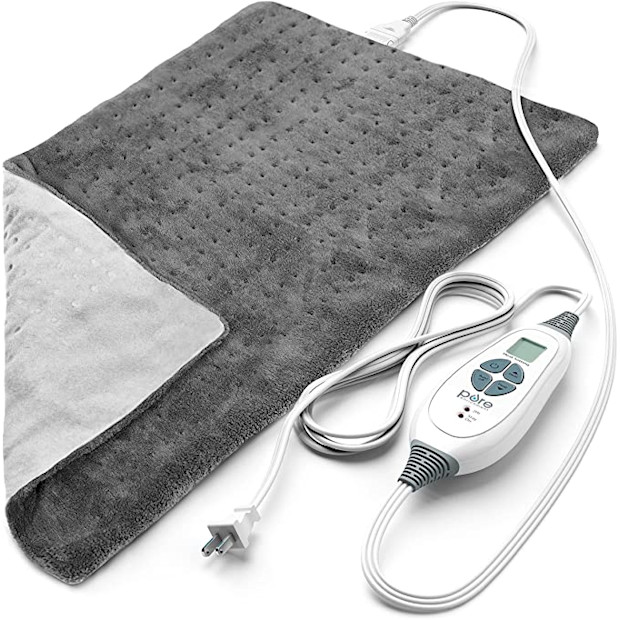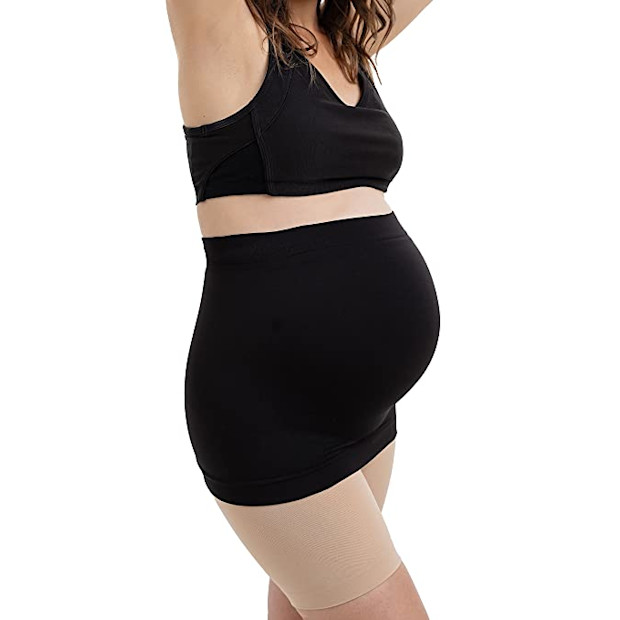
26 Weeks Pregnant
At 26 weeks pregnant, baby is the size of a Happy Meal—and you might start thinking about a birth plan.

In This Article
You’re nearly finished with your second trimester. At this point, baby is about the size of a McDonald’s Happy Meal and may start settling into a sleep pattern—of course, it might be the opposite of yours.
How Many Months Is 26 Weeks Pregnant?
26 weeks is 6.5 months pregnant, and you’re nearing the end of the second trimester. While you're probably pretty sure of your due date by now, you can double-check it with our due date calculator.
Your Baby at 26 Weeks
Your baby is starting to get on a regular schedule, but it’s one that may keep you up at night. See what’s happening with your baby’s development this week.
Sleep routine: Now that they know up from down, your baby is starting to develop regular sleep and wake patterns. Don’t be surprised if they’re active while you’re still and sleeping while you’re on the move.
Immune system: Your little one is starting to build up immunities to protect against infections after birth, thanks to the placenta. Between the placenta and colostrum (the antibody-rich pre-milk), your body is working hard to protect baby.
Eyes: This week baby’s eyes may open. According to Dr. Andreina Colatosti Catanho, a specialist of obstetrics and gynecology, “The cornea, pupil, iris, lens and retina begin to develop around week seven of pregnancy.” But it’s around this time that they begin to open. “Baby's eyes start to open towards the end of the second trimester of pregnancy in response to light,” says Dr. Catanho. Eye color won’t be determined until a few months after birth.
Lashes: During week 26, baby’s eyelashes are starting to grow. Right now, baby’s hair is completely white but it will eventually develop pigment. “However, it’s not until week 32 that eyelashes and eyelids take their nearly fully developed appearance,” says Dr. Catanho.
How Big Is Your Baby at 26 Weeks?
Your baby is around 9 inches long from crown to rump this week and weighs 1.7 pounds. That’s about the size of a McDonald’s Happy Meal box.
Top Tip for 26 Weeks Pregnant
Your birth plan should be simple, so keep it short (one page) and use bullet points when possible.
26 Weeks Baby Movement
At 26 weeks, baby may trade their twisting and turning for smaller jerking movements—it’s getting tight in there! The Cleveland Clinic reports at 26 weeks, doctors may encourage you to start doing kick counts, which is when you record how many times baby moves in a one-hour period.
Your Body at 26 Weeks Pregnant
You’re nearing the end of your second trimester, so it’s not uncommon for your growing body to feel achy and uncomfortable. Tiredness, sleeping problems and even vivid dreams are common during this stage of pregnancy.
26 Week Pregnancy Symptoms
Here are other symptoms you may experience in week 26 of pregnancy:
Hemorrhoids
You may develop hemorrhoids, which are a variation of varicose veins (basically swollen blood vessels) in one of the most sensitive areas of your body. They vary from uncomfortable to incredibly painful and can cause bleeding when you poop. Try to avoid becoming constipated by eating a high-fiber diet, staying hydrated and exercising regularly. Also, do your kegels. If you are already suffering from hemorrhoids, consider buying a sitz bath, which goes on your toilet and lets you bathe that tender area in warm water. Use those baby wipes that you're stocking up on or get some with witch hazel to help soothe the area.
Higher blood pressure
If your blood pressure is slightly high (140/90 or higher) at a doctor's visit, it’s probably no biggie and just a one-time thing. If high blood pressure first gets noticed after week 20 and lingers, it’s called gestational hypertension. This is a pregnancy-induced condition that should go away after delivery. You’ll be watched closely though since one in four people with gestational hypertension develops preeclampsia, a very serious pregnancy condition.
Back pain
Ah, the joys of pregnancy. Cedars-Sinai reports that 50-80% of pregnant women get back pain, as their posture and center of gravity change, and the added weight is a lot for backs to support. You might find that your back aches more when you’re stressed. Rest, physical therapy exercises and a support belt may help. Also, wear comfy shoes and sleep on your side with a pregnancy pillow. Some birthing parents say visits to a chiropractor or massage therapist help them. If you opt for this route, find someone experienced in prenatal care.
Headaches
Headaches are common during pregnancy—hormones, posture and vision changes, fatigue, low blood sugar, dehydration and stress can all contribute. Doctors generally okay Tylenol during pregnancy (acetaminophen) for most people but ibuprofen (Advil and Motrin) and aspirin are off-limits. If you have migraines, talk to your healthcare provider.
26 Weeks Pregnant Symptoms Not To Ignore
As always, whenever you’re suspicious something might be off with you or baby, it doesn’t hurt to run it by your doctor. Concerning symptoms in week 26 of your pregnancy include: a racing heart, change in eyesight or any severe or sudden pain according to Healthline.
Pregnancy Symptoms Coming Up In Week 27:
Mood swings, abdominal pain and restless legs are some symptoms you may experience during week 27.
✅ 26 Weeks Pregnant Checklist
Declutter! Before baby arrives is a great time to Marie Kondo your stuff.
Write that birth plan—but make mental space for the unexpected.
Have a fur baby? Figure how to prep them for your new baby. If needed, line up a dog walker or trainer for once baby comes.
Commonly Asked Questions About 26 Weeks Pregnant
Your pregnant belly is growing and so is your to-do list. You may have questions about which things to tackle, and when to put your feet up.
What should I take care of before baby arrives?
Use your second-trimester energy to declutter your home. This is one of those life tasks that will likely take a backseat once your baby is born. Plus, babies come with a lot of stuff, and stuff needs space. A few months from now, you’ll be super grateful you made extra room in your closets.
Should I be wearing special underwear?
Upgrade your usual undies to maternity ones and feel the sweet relief that comes when you no longer have elastic digging into your skin. Maternity underwear sits comfortably below your belly without sticking in the wrong places. And you won’t have to worry about extra discharge ruining your nice stuff.
When should I start making a birth plan?
If you haven’t started thinking about the kind of delivery you’d like to have, you probably will in the coming weeks. It can be useful to write a birth plan that outlines your preferences for things like who you want in the delivery room and if you’d like pain meds or not. (Get more details and suggestions here). Regardless of your ideal birth, one of the kindest things you can do for yourself is to recognize that only so much is in your control. The main goal is a healthy baby and a healthy you.
To learn even more about creating a birth plan, listen to our exclusive birth plan episode on the Birth with Babylist podcast.
How do I deal with feeling overwhelmed?
You’re nearing the end of the second trimester, and things are getting real! In less than three months, you’ll be considered full-term. As reality settles in, all that you hope to get done is probably taking up lots of room in your mind. Do yourself a favor and get it on paper. A to-do-before-baby list will help you stay organized and ensure that you get done what you need to before baby’s big entrance.
Is pregnancy brain real?
Feeling forgetful? There’s no scientific evidence that being pregnant affects your memory and makes you forget where you put your keys or that you were supposed to bring a dish to that potluck. But with all the changes going on in your body, stress and extra things to remember (go to your prenatal appointments, don’t eat this or that, sleep on your left side …), it’s no wonder you feel a little flaky. Your brain is changing, though—for the better, say researchers. Pregnancy and motherhood increase brain plasticity. They’re creating new neurological connections to help you bond with your baby and handle your new parental responsibilities.
Recommended Products for Week 26 of Pregnancy
You’ve made it this far! And now, it’s all about doing things to make yourself more comfortable and also to document the process. Here are some products that will help you do all of the above.
Sources
Andreina Colatosti Catanho, DO. PGY1, Department of Obstetrics and Gynecology at The Brooklyn Hospital Center
This information is provided for educational and entertainment purposes only. We do not accept any responsibility for any liability, loss or risk, personal or otherwise, incurred as a consequence, directly or indirectly, from any information or advice contained here. Babylist may earn compensation from affiliate links in this content. Learn more about how we write Babylist content and the Babylist Health Advisory Board.



